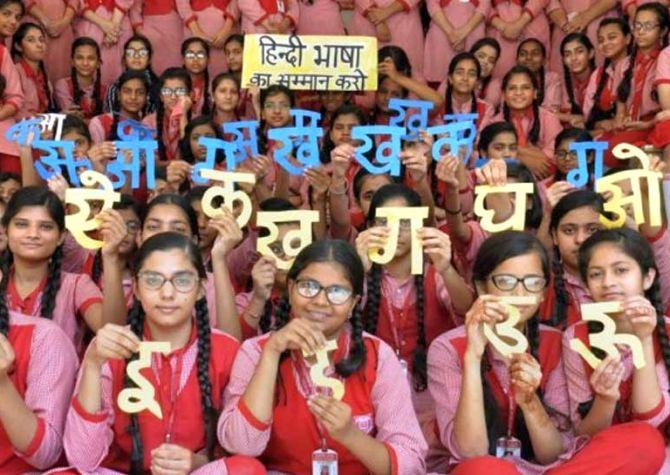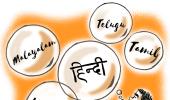Flowing from an inadequate understanding of Tamil history and politics is an urban elitist mindset that does not seem to be able to touch and feel the real angst of the larger Tamil-speaking masses, cutting across the social and economic status of the individual, says N Sathiya Moorthy.

Friday in, Monday out.
Just over the weekend, ‘Dravidian’ Tamil Nadu got the Union human resources development ministry to change the original draft of the K Kasturirangan Committee Report on a new national education policy with an amended version on the ‘language front’.
Such quick and positive action on ‘people-centric’ demands from the state were unheard of in the months ahead of elections 2019, which proved to be a disaster for Prime Minister Narendra Modi’s BJP-NDA in the state even as much of the rest of the country gave them a victory bigger than in 2014.
Kasturirangan, former ISRO chairman, may not have been wide off the mark when he said that a few ‘alternatives’ were ready with them for quick replacement should problems arise with the original. Maybe his ‘ISRO experience’ helped, as he said after the change-over, but it might have put off a new language policy for the state by at least another decade.
Yet, if someone at the Centre thought that inducting two top-rung Modi colleagues in Finance Minister Nirmala Sitharaman and External Affairs Minister S Jaishanker may have helped ‘clear Tamil misgivings’, that’s not the case. Though Tamil by birth and upbringing, they are successful stand-outs for the ‘three-language formula’, which was at the focus of ‘Dravidian’ political criticism, bordering on street protests.
Worse still, the induction of the two into the debate on the subject only helped divert the social media attention towards their suitability for doing damage control. There was the added question if this time Modi’s political strategists wanted to add two high-flying Tamils as possible chief ministerial candidates of the BJP, ahead of the state assembly polls, due in May 2021.
The ‘language row’ in Tamil Nadu has a long history, dating back to the pre-Justice Party era, which in turn was born only in the second decade of the last century. The nation however remembers only the ‘anti-Hindi’ agitation of mid-'60s, when then Prime Minister Lal Bahadur Shastri acted on the letter of predecessor Jawaharlal Nehru’s commitment to give non-Hindi speakers time to learn the language -- and, not to the spirit behind the promise.
The nation’s understanding of the anti-Hindi agitation got caught in a political milieu when the ruling Congress party lost the 1967 elections in the state, to the up and coming DMK, which had led the street protests against ‘Hindi imposition’.
The problem with introducing the ‘three-language formula’, otherwise in practical usage and practice, in the state is when the Centre is seen as ‘imposing’ Hindi on an unwilling population, while for those welcoming it see it only as an ‘anti-Dravidian’ political propaganda. Political party leaders like DMK’s M K Stalin and MDMK’s Vaiko made the nuanced difference between ‘Hindi learning’ and ‘Hindi imposition’ in their statements over Saturday and Sunday, after the original draft of the Kasturirangan Report was uploaded on the ministry website on Friday.
Against this, those that welcomed the ‘three-language formula’ in Tamil Nadu, confined their defence to worn out clichés to DMK and other Dravidian party leaders letting their own children and schools run by family members to learn/teach Hindi, but denying the same facility to the masses, who could get better jobs elsewhere in the country with mastery over the language.
In the contemporary, twenty-first century context, such an argument suffers on two counts. Unlike in first half of the previous century, it’s not the illiterate and semi-literate Tamils who are now travelling across the country, looking for jobs. Today’s ‘Tamil migrants’ in other states are qualified in technical and management education, and are gainfully employed in industrial cities as tech professionals and corporate managers, in big cities.
It may be true that the new job profile of your average Tamil youth is not what Bollywood may have projected in the past, but someone whose position in the job and social structure provide him little need and opportunity for constant interaction with locals, and thus his needing to know the local language -- or, the ‘link language’ that Hindi has been, all along, across north India.
Flowing from this first construct is the second reason why the ‘pro-Hindi’ lobby in Tamil Nadu has got it wrong. The educational and career climb-up of the average Tamil in recent decades has also meant that the odd jobs that require semi-literate and/or semi-skilled labour locally has brought in non-locals, especially from the east and north-east, and elsewhere, too. This has meant that they end up learning Tamil, and his bosses/masters too pick up a smattering of Hindi, in the process.
In industrial cities like Coimbatore and Tiruppur, Dindigul and Sivakasi, there has always been a shortage of shop-floor hands, and advertisements used to be nailed to street corner trees across interior north-east and east, for hiring more hands. In recent years and decades, the need for job hands in ‘front-office’ jobs in big-time hospitality industry, street corner restaurants and supermarkets all have mushroomed, with the result very many youth of both genders have been working the shifts all across Tamil Nadu, including small villages.
In between, there were complaints of ‘migrant labour’ involved in petty crimes, including theft and house-breaks, and even more serious ones like rape and other sex-offences, at times ending up in murder. Today, the Tamil Nadu government and the police have a fair idea of the jobs that the ‘internal migrants’ are employed in, their living quarters and lifestyles, with the result no major crime reported has their hand in recent months and years.
Against this background, for either the Centre to kick up an avoidable language row without overall consideration to transformational societies like in Tamil Nadu can have consequences that might be unmatched by the action-reaction cycle.
Suffice to recall how in the not too distant past, a mere social media rumour -- later, found have had origins in adversarial Pakistan -- was enough to send panic across the north-eastern migrant labour in Bengaluru and all across south India, and their families and state governments.
The past decade of pro-Hindutva political and social media activity in Tamil Nadu has again travelled on parallel lines, unrelated to the core of Dravidian electoral agenda as against socio-political ideology, which did not have real purchase even in its time. As events of the early decades of the twentieth century proved, the Justice Party continued to win elections in the pre-Independence Madras Presidency only because the ‘nationalist’ Congress party had boycotted them, on principle.
When the Indian National Congress changed tactic, in elections 1937, the Justice Party was gone. Even when the Justice Party kept winning elections since 1920, it was over the larger ‘social justice’ plank, without reference to any of the later-day, Periyar era ‘anti-Hindu, anti-god, anti-Brahmin’, and hence ‘anti-Sanskrit’ ideological shifts and tactical assertions.
The larger Tamil population has been as god-fearing and as religious as any other community elsewhere in the country, and their electoral preference has not been properly understood by a certain section of the local population, and most, elsewhere. It’s not their problem, and the Tamils have not bothered to ‘educate’ the ‘unwilling’ and/or the ‘unconcerned’.
If the DMK and the breakaway AIADMK have been winning elections in the state, it owed not to the ‘anti-Hindi’, or ‘anti-god’ or ‘anti-Hindu’ politics of the Dravidian majors, as alleged, but to anti-incumbency in 1967 and better cadre management, since, compared to the national parties, including the two communist parties and now the BJP.
Flowing from this inadequate understanding of Tamil history and politics is an urban elitist mindset that does not seem to be able to touch and feel the real angst of the larger Tamil-speaking masses, cutting across social and economic status of the individual. In recent times, it became evident in the ‘anti-Jallikattu protests’ of 2017, and a host of ‘environmental concerns’, whose understanding has become deeper to a new generation of educated Tamils. The effort thus should be to address their genuine concerns and educate them otherwise, in a more serious way than joining issues on social media trivia, bandied about by peripheral groups.
The sad outcome of it all is for a certain section of the pro-Hindi lobby in the state this time too, to confuse their willingness to learn a new language to attributing Hindi’s origins to Sanskrit, and defending the antiquity of the latter against that of Tamil. Through recent years of ‘political Hindutva’ social media campaign, the effort has been to highlight the antiquity and spread of Sanskrit and ancient Indian science and scriptures, projecting them as ‘Hindu achievements’ and not ‘Indian contributions’.
Such an approach has also been devoid of equal space and respect for the antiquity of Tamil, as a stand-alone ancient language which is very much in vogue in common usage, the oldest acknowledged one compared even to Sanskrit. This has spawned a new social media ‘industry’ on the opposite side, too, with sections promoting and projecting the spread and reach of Tamil language, culture and artefacts to distant lands several hundred years ago.
While both sides may be true and correct, this has instead spread mutual hatred and suspicions with the result when before the elections, a social media campaign proclaimed that Sanskrit was spoken in ancient Syria, too, and possibly before India, pat came the response in a parallel campaign over the same medium: 'Yes, that has also been our argument. You and your language do not belong to India. You all are vantherigals...' (loosely translated as ‘immigrant-usurpers).
N Sathiya Moorthy, veteran journalist and political analyst, is Director, Observer Research Foundation, Chennai Chapter









